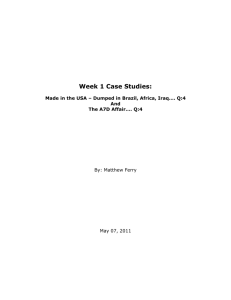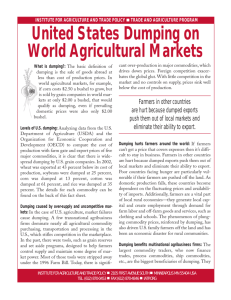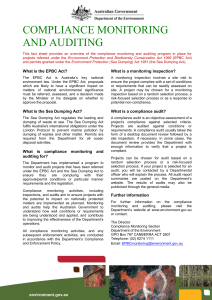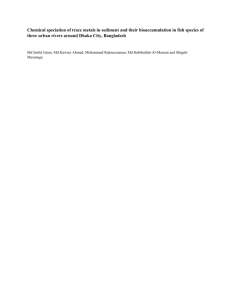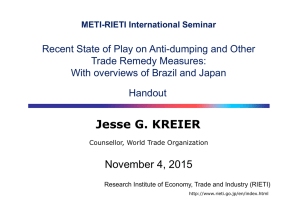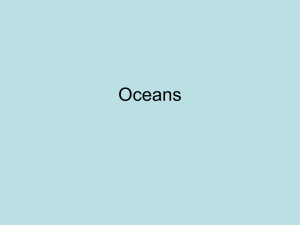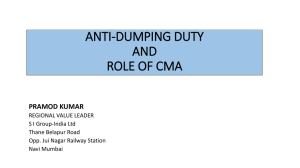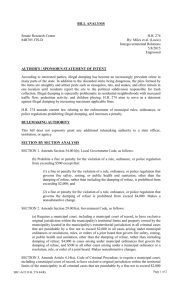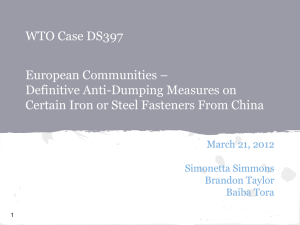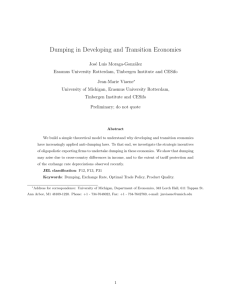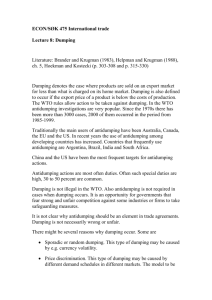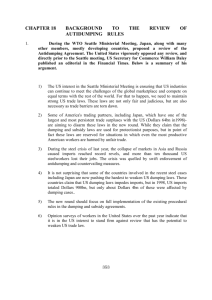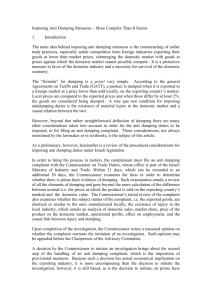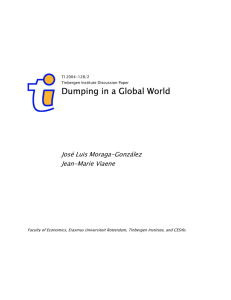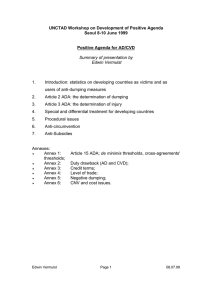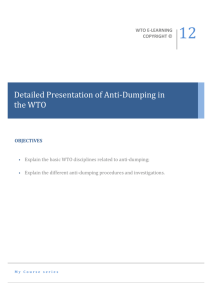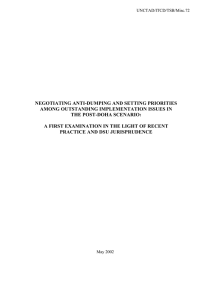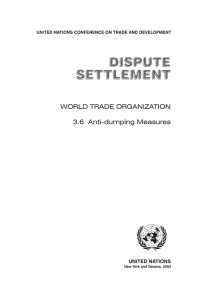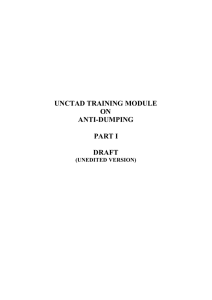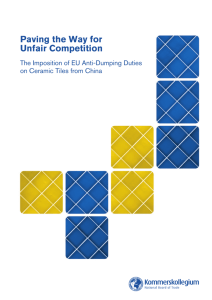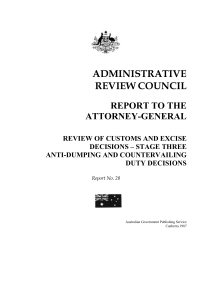- International Burch University
advertisement
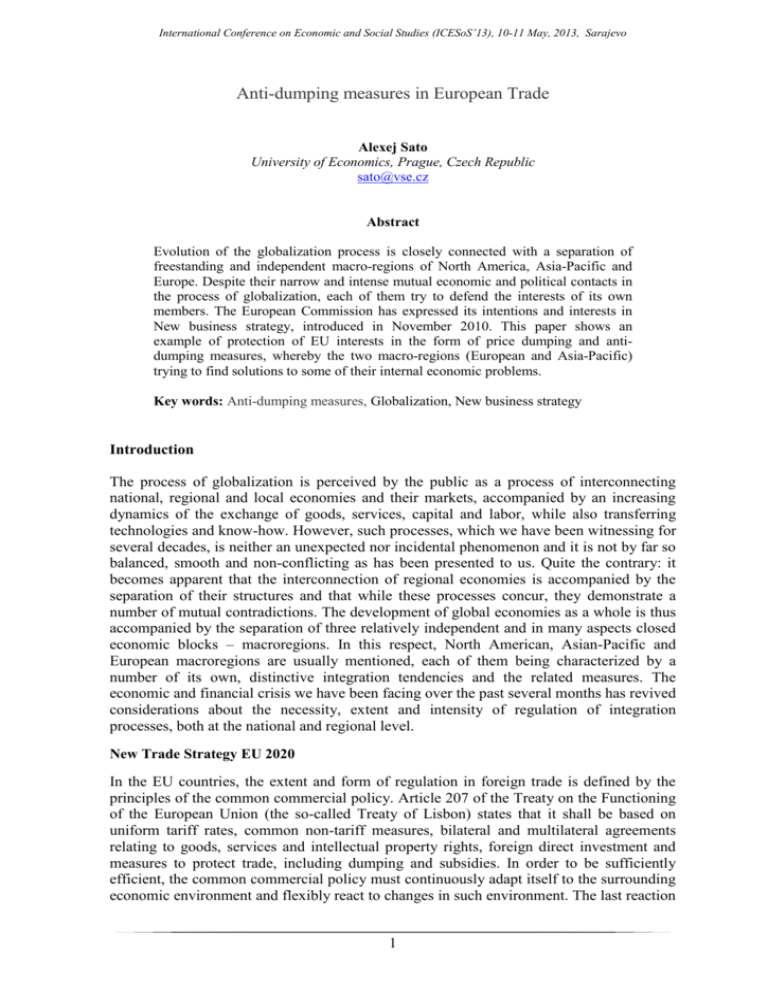
International Conference on Economic and Social Studies (ICESoS’13), 10-11 May, 2013, Sarajevo Anti-dumping measures in European Trade Alexej Sato University of Economics, Prague, Czech Republic sato@vse.cz Abstract Evolution of the globalization process is closely connected with a separation of freestanding and independent macro-regions of North America, Asia-Pacific and Europe. Despite their narrow and intense mutual economic and political contacts in the process of globalization, each of them try to defend the interests of its own members. The European Commission has expressed its intentions and interests in New business strategy, introduced in November 2010. This paper shows an example of protection of EU interests in the form of price dumping and antidumping measures, whereby the two macro-regions (European and Asia-Pacific) trying to find solutions to some of their internal economic problems. Key words: Anti-dumping measures, Globalization, New business strategy Introduction The process of globalization is perceived by the public as a process of interconnecting national, regional and local economies and their markets, accompanied by an increasing dynamics of the exchange of goods, services, capital and labor, while also transferring technologies and know-how. However, such processes, which we have been witnessing for several decades, is neither an unexpected nor incidental phenomenon and it is not by far so balanced, smooth and non-conflicting as has been presented to us. Quite the contrary: it becomes apparent that the interconnection of regional economies is accompanied by the separation of their structures and that while these processes concur, they demonstrate a number of mutual contradictions. The development of global economies as a whole is thus accompanied by the separation of three relatively independent and in many aspects closed economic blocks – macroregions. In this respect, North American, Asian-Pacific and European macroregions are usually mentioned, each of them being characterized by a number of its own, distinctive integration tendencies and the related measures. The economic and financial crisis we have been facing over the past several months has revived considerations about the necessity, extent and intensity of regulation of integration processes, both at the national and regional level. New Trade Strategy EU 2020 In the EU countries, the extent and form of regulation in foreign trade is defined by the principles of the common commercial policy. Article 207 of the Treaty on the Functioning of the European Union (the so-called Treaty of Lisbon) states that it shall be based on uniform tariff rates, common non-tariff measures, bilateral and multilateral agreements relating to goods, services and intellectual property rights, foreign direct investment and measures to protect trade, including dumping and subsidies. In order to be sufficiently efficient, the common commercial policy must continuously adapt itself to the surrounding economic environment and flexibly react to changes in such environment. The last reaction 1 International Conference on Economic and Social Studies (ICESoS’13), 10-11 May, 2013, Sarajevo to global economic changes is the strategic communication from the European Commission of 9 November 2010 entitled „Trade, Growth and World Affairs“, which indicates the way to increasing the openness of European economy and to improving trade relationships with non-EU partners. In its New Trade Strategy EU 2020, the European Commission mentions six current priorities for its forthcoming negotiations: - To finalize, under the auspices of WTO, negotiations with the main trade partners (such as India, Mercosur and others) and to achieve an increase in the EU GDP growth by another, more than 1%. - To improve trade relationships with strategic partners (U.S., China, Russia and Japan), in particular by removing non-tariff trade barriers. - To improve European companies' access to world markets by creating a mechanism of balance renewal between open markets in the EU and more closed markets of trade partners outside the Union (in the form of public procurement, for instance). - To initiate negotiations with key trade partners concerning profound changes of investment conditions. - To ensure a wider applicability of EU law-based rules in trade. - To improve access to trading activities for all those who might be interested, to change rules for providing trade preferences to developing countries. In mentioning New Trade Strategy EU 2020, the European Commission expects that by 2015, 90% of world growth will be generated outside Europe, with approximately a third from China. Nevertheless, it intends to continuously seek to maintain world trade openness. In this respect, the European Commission works on the basic presumption that open economies tend to grow faster than closed economies and therefore, open markets are necessary to support its own, European competitiveness. These considerations also match with the Commission's effort to further reduce tariff rates, to conclude on-going negotiations concerning multilateral world trade liberalization, to open markets for services and investment and the possibility to participate in public procurement. This time, liberalization efforts should be more selective rather than general, in particular with respect to the main initiators of world growth, such as the BRIC countries, U.S. and Japan, which is also demonstrated by the current on-going process of negotiations. Of course, the previously mentioned vision is not completely original; the European Commission took numerous similar steps already in the past, although not always with clear positive results. One of the serious problems which occurred in the past was the relatively limited accessibility of liberalization steps for certain business entities. Especially small and medium-sized enterprises, which face a number of restrictions and barriers of administrative, legislative or fiscal nature when entering foreign markets, could not make use of the negotiated benefits. According to the 2010 Eurobarometer survey, only 8% of the total number of small and medium-sized European companies have been doing business abroad. As results from the strategic communication, the European Commission intends to be helpful, but not naive, towards its potential trade partners in trade policy matters in the future. The efforts to enhance the protection of intellectual property rights, to achieve the global harmonisation of technical and technological standards and to fight unfair practices 2 International Conference on Economic and Social Studies (ICESoS’13), 10-11 May, 2013, Sarajevo as well as the infringement of global trade rules are evident. In particular, the efforts to create and strengthen the role of tools for the enforcement of interests and rights, for instance through the World Trade Organisation (WTO), are significant. The content of the previously mentioned visions in discussions about the future trade and political strategy is sometimes termed „Assertive Europe“. Anti-dumping measures Anti-dumping measures are relatively frequently used and very controversially viewed protective tools of the EU trade policy. They allow to restrict the import of goods from third countries in such cases when the seller (producer) offers its product in the EU market at a price that is lower than the normal price for that product in such seller's (producer's) domestic market, thus causing material injury to domestic (European) producers. Such behavior (price dumping) is defined in Article VI of GATT, according to which dumping occurs if the price of a product is lower than the price of the like product sold by the exporter in the exporter's domestic market. If the producer does not sell the product in the domestic market, the price of goods is considered to be lower in the following cases: - If it is lower than the price of other domestic producers of the like (comparable) product destined for export to any other third country in the ordinary course of trade; - If the price is below the cost of production of the goods in the exporter's domestic economy, increased by a reasonable profit on sales. The investigation of complaints from the EU industry concerned due to alleged price dumping is conducted by the European Commission, which also proposes measures if dumping is ascertained. In the Czech Republic, protective measures associated with the implementation of the common commercial policy are governed by the Ministry of Industry and Trade. The Ministry collects and analyses information and opinions from the interested parties, professional associations and unions, its own specialist departments and other state administration bodies and institutions and formulates official opinions of the Czech Republic through its Anti-Dumping and Anti-Subsidy Advisory Committee and for the purpose of optimal defense of Czech entrepreneurs' interests. The industries most frequently affected by international dumping include, in particular, chemical and metallurgical production or clothing and textile industries. In the past, all these industries gained a very strong position in the Union market, which they were, however, not able to maintain being confronted with the competition from developing and newly industrialized countries (mainly from Asia). In the past decade, the European Commission initiated more than 330 investigations related to dumping allegations, in particular in the manufacturing of chemical, steel or metallurgical products, of which around 20% concerned exports from China. Almost 70% of investigations did prove the existence of dumping and were concluded by announcing an anti-dumping measure. However, in the same period, China applied only six measures of similar nature. The stated reasons for alleged price dumping include, in particular, the low wages of Chinese employees with relatively low production costs and the resulting high competitiveness. In 2010, the EU-China trade reached 320 billion EUR with an annual increase of almost one fifth. The growing volume of Chinese exports resulted in a rapid increase in the EU trade and payment 3 International Conference on Economic and Social Studies (ICESoS’13), 10-11 May, 2013, Sarajevo Balance deficit towards China and a number of Union industries became dependent on imports from China. The individual EU member states have different opinions about the trade policy in terms of dumping stations. Discrepancies exist mainly between the countries with a more liberal view of the functioning of international trade (UK, Scandinavia) and the countries who rather prefer protectionist principles of trading (Germany, Italy, Portugal, Spain), mostly those most deeply affected by dumping. In order to be able to objectively recognize the need for anti-dumping measures, the following facts required by international conventions should be objectively identified and supported with evidence: - The existence of dumping – which means to demonstrate the fact that a dumped product is present in the market and is offered at a price that is lower than the price for that product in the exporter's domestic market. - The existence (or threat) of material injury to an EU industry (for instance, the loss of market share, a significant drop in sales, profit or productivity of the industry). - The causal link between the existing dumping and the injury caused. A complaint leading to an anti-dumping investigation may be lodged by any natural or legal person, or any association, acting on behalf of the whole Community industry. The preparation of the complaint, which is quite a demanding task from the administrative, financial, technical and linguistic point of view, can be entrusted to national control and administrative bodies before the complaint is lodged with the European Commission; in the Czech Republic it is the Ministry of Industry and Trade. The Commission initiates the investigation only when it makes sure that the complaint is supported by Union producers whose production accounts for at least 25% of the total Union production of the product to be investigated. Proceedings are not initiated against countries whose alleged dumped imports represent a Union market share of below 1%, or against a group of countries whose collective share does not exceed 3%. In exceptional cases, the Commission may initiate proceedings also of its own decision and without any complaint being lodged. When assessing the content and legitimacy of the complaint, the Commission follows Council Regulation (EC) No. 384/96 of 22 December 1995 on protection against dumped imports from countries not members of the European Community, which imposes an obligation on the Commission to decide on the complaint within 15 months of the date of lodging. Investigation may be terminated by one of the following steps: - Without adopting definitive measures the investigation is terminated if the complaint does not comply, formally or materially, with the established requirements, or if the complaint is withdrawn by the complainant and the Community has no interest to continue the investigation. - By announcing a definitive anti-dumping duty, which however requires, besides discussion in the European Commission, also approval from the EU Council. This measure can also be used if it is demonstrated during the investigation that the effects of a previously imposed anti-dumping duty are intentionally circumvented or frustrated. - The investigation may be terminated by accepting a price undertaking if the exporter is willing to change the price of its goods by the dumping difference so that the European Community interests are not harmed. 4 International Conference on Economic and Social Studies (ICESoS’13), 10-11 May, 2013, Sarajevo Both anti-dumping duties and price undertakings remain valid for a period of five years and their existence is published in the Official Journal. The Official Journal also publishes information about the expiration of the validity of individual protective measures, which allows to assess whether there is a significant risk of dumping to continue or recur and whether the Community might be exposed to injury. If no request for a further investigation of the case is presented after the lapse of the five-year period, the duty or the undertaking expires. Conclusion Within WTO and compared to other economic macroregions, the European Union is a very frequent user of anti-dumping measures against third countries, and the most frequent one in the long-term history. As regards dumping from Union producers, its share is significantly lower and has been decreasing in the long-term. In 2009, only 5% of the total number of complaints was lodged against Union producers. China is the leader among the countries with which the European Union has to solve dumping disputes most frequently: approx. 40% of all investigations are conducted against China, which is followed by other countries of Southeast Asia. Trade disputes between the EU, China and other countries of Southeast Asia have been rising proportionately to the deepening of the mutual trade and payment balance deficit. The protective measure recently adopted by the European Commission and aimed at roughly two hundred Chinese producers of screws and jointing material aroused considerable displeasure in business circles also because it includes a number of exceptions for Chinese branches of European companies raising concerns that double standards are often used with respect to the entities affected. Globalization is undoubtedly a necessary and inevitable process which brings the human society to a higher evolutionary stage. However, it is by far not as smooth and natural as is sometimes presented. Globalization is surely paralleled by a process which leads to the separation of relatively independent and distinctive economic and political structures – macroregions. Each of them uses, to a greater or lesser extent, their own organization, control and executive tools by means of which they defend, in particular, economic interests of their members on a global scale. References Agreement on Implementation of Article VI of the General Agreement on Tariffs and Trade (1994) Busch, K. (2010), World Economic Crisis and the Welfare State: Possible Solutions to Reduce the Economic and Social Imbalance in the World Economy, FriedrichEbert-Stiftung, Berlin. Available at: http://library.fes.de/pdf-files/id/ipa/07000.pdf ECIPE (European Centre for International Political Economy) Occasional Paper 2/2011: Chinese Trade Policy after ten years in the WTO: A post-crisis stocktake Communication from the Commission COM (2010) of 3 March 2010 A strategy for smart, sustainable and inclusive growth Commission Communication COM (2010) 612/4 of 9 November 2010 Trade, Growth and World Affairs 5 International Conference on Economic and Social Studies (ICESoS’13), 10-11 May, 2013, Sarajevo Council Regulation (EC) No 384/96 of 22 December 1995 on protection against dumped imports from countries not members of the European Community Kellermann, Ch., Ecke, M., Petzold, S., (2009): A new growth strategy for Europe beyond 2010, Friedrich-Ebert-Stiftung, Berlin. Available at: http://library.fes.de/pdffiles/id/ipa/06219.pdf 6
